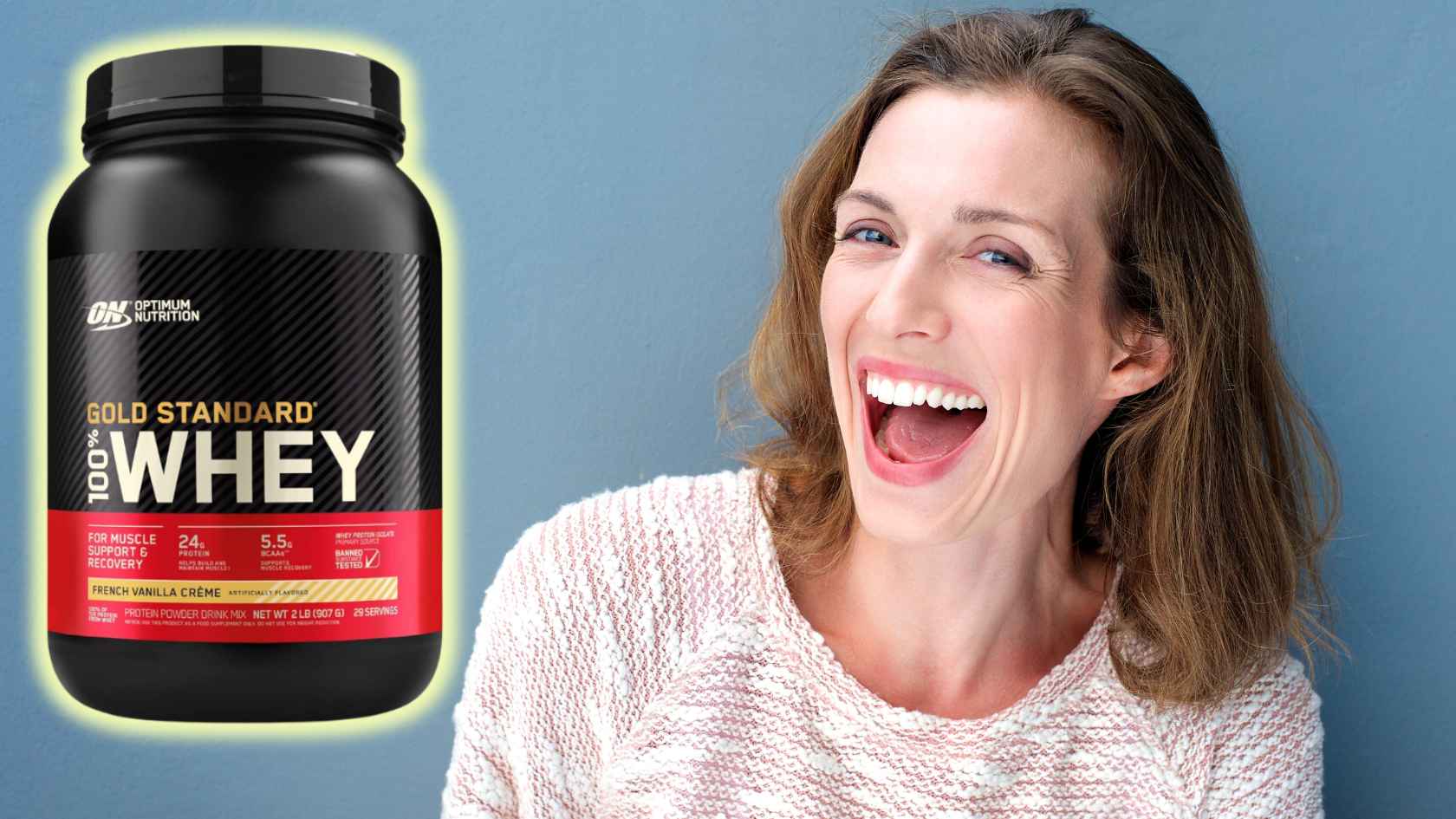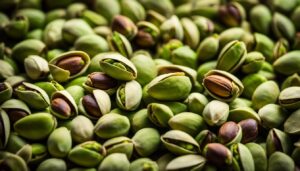Did you know that menopause can cause a significant shift in a woman’s metabolism, making weight management more challenging?
During menopause, hormonal changes can lead to decreased muscle mass and a slower metabolic rate, making it harder to lose weight or maintain a healthy weight. However, incorporating the best protein powder for menopause weight loss into your diet can make a significant difference in achieving your weight loss goals and supporting your overall health during this stage of life.
In this article, we will explore the best protein powder options for menopause weight loss, discuss the benefits of protein powder for menopausal women, delve into different types of protein powders, and provide tips on how to choose the right one. We will also address common misconceptions about protein powders and menopause and conclude with key takeaways to help you make informed decisions about your weight loss journey.
Key Takeaways:
- Menopause can lead to weight gain due to hormonal changes and a slower metabolism.
- The best protein powder for menopause weight loss can help you manage your weight and support your overall health during this stage of life.
- Protein powders are a convenient and effective way to increase your protein intake, feel full longer, preserve muscle mass, and support sustainable weight loss during menopause.
- When choosing a protein powder, consider factors such as the protein source, added ingredients, digestibility, and pricing.
- Collagen protein powder is a menopause-friendly choice that offers additional benefits for joint and skin health.
Understanding Menopause and Protein’s Role in Weight Management
Menopause is a natural stage in a woman’s life characterized by hormonal changes, which can have an impact on weight management. During this phase, it becomes particularly important for women to pay attention to their protein intake for overall health and weight management. Protein plays a crucial role during menopause, supporting muscle maintenance, bone health, and metabolic function. Understanding the link between hormonal changes and dietary proteins is essential for navigating this life stage successfully.
Protein is key during menopause due to its various benefits. First and foremost, it supports muscle maintenance, ensuring that women can preserve their muscle mass and strength as they age. This is crucial because muscle mass tends to decrease during menopause, leading to a reduction in metabolic rate and increased difficulty in managing weight. Adequate protein intake can help counteract this loss and support overall health.
In addition to muscle maintenance, protein is also important for bone health during menopause. As women age, they become more susceptible to osteoporosis, a condition characterized by weak and brittle bones. Consuming sufficient protein can help support bone density and reduce the risk of fractures, which can be particularly beneficial for menopausal women.
Metabolic function is another area in which protein plays an important role during menopause. As hormone levels fluctuate, metabolic rate can be affected, making weight management more challenging. Protein has a higher thermic effect compared to other macronutrients, meaning that it requires more energy to digest and metabolize. This can help boost metabolism and support weight loss efforts during this time.
Hormonal changes during menopause can have an impact on dietary proteins as well. Some studies suggest that estrogen, a hormone that declines during menopause, may influence protein metabolism and utilization. Menopausal women need to ensure they are consuming sufficient dietary protein to support their changing hormonal needs and promote overall health.
Why Protein is Key During Menopause
Protein plays a critical role in supporting muscle maintenance, bone health, and metabolic function during menopause. By ensuring an adequate protein intake, women can help preserve muscle mass, support bone density, and maintain or even boost their metabolism. Protein also helps create a feeling of fullness, which can reduce cravings and support weight management. Including protein-rich foods and incorporating protein powder into the diet can be an effective strategy for menopausal women looking to manage their weight and support their overall health during this stage of life.
The Link Between Hormonal Changes and Dietary Proteins
As hormone levels fluctuate during menopause, it’s important to consider the impact on dietary proteins. Estrogen, one of the hormones that decline during menopause, may affect protein metabolism and utilization. Adequate protein intake becomes even more crucial during this phase to support the changing hormonal needs and promote overall health. By understanding the link between hormonal changes and dietary proteins, menopausal women can make informed choices to optimize their weight management and well-being.
How to Choose the Best Protein Powder for Menopause Weight Loss
With a multitude of protein powder options available in the market, choosing the best one for menopause weight loss can be overwhelming. To ensure you make an informed decision, consider the following factors:
- Protein Source: Look for protein powders that contain high-quality protein sources, such as whey, casein, or plant-based proteins like pea, hemp, or soy. These sources provide essential amino acids that support muscle maintenance and overall health during menopause.
- Added Ingredients: Check the ingredients list for any additives, sweeteners, or artificial flavours that may not align with your dietary preferences. Opt for protein powders with minimal added ingredients and avoid those with excessive sugar or artificial additives.
- Digestibility: Consider the digestibility of the protein powder. Some individuals may experience digestive discomfort with certain types of protein. If you have any sensitivities or intolerances, choose a protein powder that is easy to digest, such as a hydrolyzed or isolated form.
- Price: Compare the prices of different protein powders and consider your budget. Keep in mind that higher-priced products don’t always guarantee superior quality, so weigh the cost against the overall value and benefits offered by the protein powder.
By taking these factors into account, you can select the right protein powder for menopause weight loss that suits your specific needs and preferences.
The Benefits of Protein Powder for Menopausal Weight Loss
Protein powders have become a popular choice for menopausal women who are looking to achieve weight loss goals. These powders offer a range of benefits that can support women during this stage of life. In this section, we will explore two key benefits of protein powder for menopausal weight loss: feeling full longer and sustaining muscle mass.
Feel Full Longer with High-Protein Supplements
One of the biggest challenges in weight loss during menopause is managing cravings and hunger. Protein powders can help address this issue by providing a feeling of fullness and satisfaction. Consuming a high-protein supplement, such as a protein shake or smoothie, can help you stay satiated for longer periods, reducing the temptation to snack on unhealthy choices. This can ultimately contribute to better adherence to a calorie-controlled diet, facilitating weight loss.
To illustrate the power of protein in promoting satiety, a study published in the American Journal of Clinical Nutrition found that participants who consumed a high-protein meal replacement experienced greater feelings of fullness and had reduced levels of the hunger hormone ghrelin compared to those who consumed a high-carbohydrate meal replacement.
Sustaining Muscle Mass Through Menopause
Preserving lean muscle mass is essential for overall health, weight management, and metabolic function during menopause. As estrogen levels decline, women naturally experience a decrease in muscle mass. However, protein powder can help counteract the loss of muscle mass by providing the necessary amino acids for muscle protein synthesis.
A study published in the Annals of Nutrition and Metabolism found that menopausal women who consumed a whey protein supplement experienced improvements in muscle strength and mass compared to those who did not supplement with protein.
By incorporating protein powder into your diet, you can support muscle maintenance and minimize the negative effects of muscle loss during menopause.
| Benefits of Protein Powder for Menopausal Weight Loss: |
|---|
| Feeling full longer and reducing cravings |
| Sustaining muscle mass during menopause |
Best Protein Powder for Menopause Weight Loss
When it comes to choosing the best protein powder for menopause weight loss, it’s important to consider options that are effective, high-quality, and suitable for menopausal women. We gathered expert reviews and customer feedback to recommend top protein powders that can support your weight loss goals during this stage of life.
1. Brand Optimum Nutrition Protein Powder: This protein powder has received rave reviews for its weight loss benefits in menopausal women. It contains a blend of high-quality proteins that promote satiety, helping you feel full longer and control cravings. Additionally, it supports lean muscle maintenance, which can be particularly beneficial during menopause.
2. Brand Premier Protein Menopause Formula Protein Powder: This protein powder is specifically formulated to address the unique nutritional needs of menopausal women. It contains a blend of essential amino acids, vitamins, and minerals that support hormonal balance and weight management. It also includes ingredients known for their thermogenic properties, which can enhance calorie burning.
3. Brand Garden of Life Organic Plant-Based Protein Powder: If you prefer plant-based protein options, this protein powder is an excellent choice. It is made from a blend of organic pea, brown rice, and hemp proteins, providing a complete amino acid profile. It is also rich in fibre, which aids in digestion and helps regulate blood sugar levels.
“I have been using Brand Optimum Nutrition Protein Powder for a few months now, and I’ve noticed a significant improvement in my weight loss journey during menopause. It keeps me full and satisfied, and the taste is great!” – Emily
Remember, choosing the right protein powder for menopause weight loss is a personal decision. It’s essential to consider your individual needs, preferences, and any specific dietary restrictions you may have. Consult with your healthcare provider before incorporating any new products or supplements into your diet.

Exploring Different Types of Protein Powders for Menopause
Menopausal women have a variety of protein powder options to choose from, each with its benefits. In this section, we will explore different types of protein powders for menopause, including whey protein and plant-based proteins. We will discuss why whey protein is a popular choice for muscle maintenance and how plant-based proteins can contribute to a heart-healthy diet during menopause.
Whey Protein: A Popular Choice for Muscle Maintenance
When it comes to protein powders, whey protein is a top choice for menopausal women looking to maintain their muscle mass. Derived from milk, whey protein is a complete protein that contains all nine essential amino acids necessary for optimal muscle function and growth. It is easily absorbed by the body, making it an efficient and effective option for women experiencing muscle loss or decreased muscle strength during menopause.
Studies have shown that whey protein supplementation can help preserve lean muscle mass, support muscle recovery, and enhance overall physical performance. Menopausal women who engage in regular exercise, including resistance training, can benefit from including whey protein in their diet to support muscle maintenance and promote an active and healthy lifestyle.
Plant-Based Proteins for a Heart-Healthy Diet During Menopause
Plant-based proteins offer menopausal women a heart-healthy alternative to animal-based protein powders. These protein powders are derived from plant sources such as peas, hemp, soy, and rice, and are often rich in fibre, antioxidants, and other beneficial nutrients. Plant-based proteins are also typically lower in saturated fat, making them a suitable choice for women who want to follow a heart-healthy diet during menopause.
Research has shown that plant-based proteins can have positive effects on heart health, including reducing the risk of cardiovascular diseases. Additionally, plant-based proteins are naturally cholesterol-free and may help lower cholesterol levels, which can be beneficial for menopausal women who may experience changes in their cholesterol levels during this stage of life.
| Protein Powder | Source | Benefits |
|---|---|---|
| Whey Protein | Derived from milk | Complete protein, easily absorbed, supports muscle maintenance |
| Plant-Based Proteins | Derived from plants (peas, hemp, soy, rice, etc.) | Heart-healthy, rich in antioxidants and fibre, cholesterol-free |
By considering their individual needs and preferences, menopausal women can choose the protein powder that best aligns with their health goals and dietary requirements. Whether it’s whey protein for muscle maintenance or plant-based proteins for a heart-healthy diet, protein powders can provide valuable support during the menopausal transition.
Collagen Protein Powder: A Menopause-Friendly Choice
Collagen protein powder is an increasingly popular option among menopausal women who are seeking to support their joint and skin health. Collagen is a structural protein that plays a crucial role in maintaining the integrity of connective tissues, such as tendons, ligaments, and skin. As women go through menopause, the decline in estrogen levels can contribute to a reduction in collagen production. This can lead to a variety of symptoms, including joint discomfort and decreased skin elasticity.
How Collagen Supports Joint and Skin Health
Collagen supplementation can be beneficial for menopausal women by providing the necessary building blocks for collagen synthesis. By incorporating collagen protein powder into their daily routine, women may experience improvements in joint comfort and mobility. Additionally, collagen has been shown to promote skin elasticity and hydration, helping to reduce the appearance of wrinkles and support overall skin health.
Choosing a Collagen Powder with Beneficial Amino Acids
When selecting a collagen protein powder for menopause weight loss, it’s important to consider the type of collagen used and the presence of beneficial amino acids. Collagen supplements are typically sourced from animal tissues, such as bovine or marine collagen. It’s essential to choose a high-quality powder that contains collagen peptides, as these are more easily absorbed by the body.
Furthermore, certain amino acids, such as glycine and proline, are important for collagen synthesis and overall health. Look for a collagen powder that includes these amino acids to ensure you’re getting the most out of your supplement.
Case Studies: Success Stories of Protein Powder Aiding Menopausal Weight Loss
Real-life success stories can provide inspiration and motivation for menopausal women who are considering protein powder for weight loss. In this section, we feature case studies of women who have successfully used protein powder to aid their weight loss journey during menopause. These stories highlight the effectiveness of protein powder and provide practical insights and tips.
One such success story is Sarah, a 52-year-old woman who struggled with weight gain during menopause. After consulting with her healthcare provider, Sarah decided to incorporate a high-quality protein powder into her daily routine. She found that the protein powder helped her feel full for longer periods, reduced her cravings for unhealthy snacks, and improved her energy levels.
Another inspiring case study is Lisa, a 49-year-old woman who used protein powder to support her weight loss goals during menopause. Lisa incorporated protein powder into her exercise routine and noticed a significant improvement in her muscle tone and strength. She found that the additional protein helped her maintain her muscle mass, which is especially important during menopause when muscle loss can occur.
These success stories demonstrate the positive impact that protein powder can have on menopausal weight loss journeys. By incorporating protein powder into their diet and exercise regimen, Sarah and Lisa were able to achieve their weight loss goals and improve their overall well-being.
| Case Study | Age | Results |
|---|---|---|
| Sarah | 52 | Improved satiety, reduced cravings, increased energy |
| Lisa | 49 | Improved muscle tone and strength, maintained muscle mass |
The Role of Amino Acids in Menopause Weight Management
Amino acids, the building blocks of protein, play a crucial role in menopause weight management. These small compounds are essential for various biological processes in the body, including muscle growth, metabolic function, and weight loss. During menopause, hormonal changes can affect body composition and metabolism, making it important to prioritize proper nutrition and amino acid intake.
Essential Amino Acids Missing in Diet and Their Impact
Menopausal women may experience a decline in certain essential amino acids in their diet. Essential amino acids are the ones that the body cannot produce on its own and must be obtained from food sources. As hormone levels fluctuate during menopause, nutrient absorption and utilization may be affected, leading to a potential deficiency in essential amino acids.
This deficiency can have several impacts on menopause weight management. Essential amino acids are necessary for muscle maintenance and growth, which becomes increasingly important as women age. Muscle mass naturally declines with age, but incorporating protein-rich foods or protein powder into the diet can help preserve muscle tissue and prevent excessive weight gain.
Furthermore, amino acids are involved in metabolic processes that influence weight regulation. Adequate intake of essential amino acids can support metabolic function, promoting fat burning and energy expenditure. By ensuring a sufficient supply of these amino acids, menopausal women can optimize their weight management efforts.
Boosting Amino Acid Levels with the Right Protein Powder
To address the potential deficiency of essential amino acids during menopause, menopausal women can consider incorporating protein powder into their diet. Protein powder is a convenient and effective way to increase amino acid intake and support weight management goals.
There are various types of protein powders available, such as whey protein, plant-based proteins, and collagen protein. These protein powders can provide a complete amino acid profile, including the essential amino acids that may be lacking in a menopausal woman’s diet. By selecting the right protein powder that aligns with dietary preferences and goals, menopausal women can boost their amino acid levels and support overall health and weight management.
It’s important to note that protein powder should be used as a supplement to a balanced diet and not as a replacement for whole food sources of protein. Consulting with a healthcare provider or nutritionist can help determine the appropriate dosage and type of protein powder based on individual needs and health conditions.
Integrating Protein Powder into a Menopause Weight Loss Diet
Integrating protein powder into a menopause weight loss diet can be a smart strategy for optimal results. Protein is an essential nutrient that supports muscle growth, helps you feel full and satisfied, and aids in weight management. Here, we will explore convenient ways to increase protein intake using protein powder and provide tips on how to incorporate it into a balanced menopause diet.
One convenient way to increase your protein intake is by adding protein powder to your favorite beverages or recipes. You can blend protein powder into smoothies, mix it into yogurt or oatmeal, or even bake it into healthy snacks. This allows you to easily boost your protein levels without significantly changing your existing meal plan.
When choosing a protein powder, opt for high-quality options that are specifically formulated for women and menopausal individuals. Look for protein powders that contain a blend of different protein sources, such as whey protein and plant-based proteins. This ensures that you’re getting a variety of amino acids and the nutrients your body needs.
It’s also important to combine protein powder with a balanced menopause diet that includes a variety of nutrient-rich foods. Aim to incorporate lean proteins from sources such as poultry, fish, tofu, and legumes, along with a good mix of fruits, vegetables, whole grains, and healthy fats. This will provide your body with a well-rounded nutrient profile and support overall health.
By integrating protein powder into your menopause weight loss diet and combining it with a balanced meal plan, you can effectively increase your protein intake and support your weight loss goals. Remember to consult with a healthcare professional or registered dietitian before making any significant dietary changes.
Top Protein Powder Choices for Menopause Weight Loss in the UK
Menopausal women in the UK have unique nutritional needs and preferences when it comes to choosing a protein powder for weight loss. In this section, we will highlight the top protein powder choices specifically tailored to support menopause weight loss in the UK market. We understand the importance of finding the right protein powder that not only aids in weight management but also addresses the specific concerns of menopausal women.
Understanding the Unique Nutritional Needs of Menopausal Women in the UK
During menopause, women experience hormonal changes that can impact their nutritional needs and weight management. Menopausal women in the UK must choose protein powders that provide adequate nutrients to support overall health and well-being. Protein powders that are rich in essential vitamins, minerals, and antioxidants can help address the specific nutritional needs of menopausal women, such as maintaining bone health, supporting metabolic function, and providing energy.
Common Misconceptions About Protein Powders and Menopause
Protein powders have gained popularity in recent years as a convenient and effective way to support weight loss and muscle maintenance. However, there are several misconceptions surrounding their use during menopause. In this section, we will address and debunk common myths and misconceptions about protein powders and their impact on menopause. By clarifying these misconceptions, menopausal women can make informed decisions about incorporating protein powder into their weight loss journey.
“Protein powders will make me bulky.”
One major misconception is that consuming protein powders will make women bulky and increase muscle mass. However, this is far from the truth. Protein powders provide essential amino acids that support muscle repair and growth, but they do not magically build bulky muscles. In fact, protein powders can help women maintain and tone their muscles, which is especially beneficial during menopause when muscle loss can occur.
“Protein powders are only for bodybuilders.”
Another common misconception is that protein powders are exclusively meant for bodybuilders and athletes. While protein powders are certainly popular among these groups, they can be beneficial for women in menopause as well. As women age, their bodies require more protein to maintain muscle mass and support overall health. Protein powders offer a convenient way to meet their increased protein needs and support weight loss goals.
“Protein powders are not safe for menopausal women.”
Some women may believe that protein powders are not safe for menopausal women due to hormonal changes during this stage of life. However, protein powders are generally safe for menopausal women when consumed as part of a balanced diet. It is important to choose high-quality protein powders from reputable brands and consult with a healthcare provider for personalized advice and recommendations.
By debunking these misconceptions, we hope to provide clarity and empower menopausal women to make informed choices about incorporating protein powders into their weight loss and overall wellness journey. Protein powders can be a valuable tool for menopausal women to support their health and achieve their weight loss goals when used in conjunction with a balanced diet and regular exercise.
Conclusion
In conclusion, finding the best protein powder for menopause weight loss requires careful consideration of individual preferences and needs. Throughout this article, we have highlighted the importance of protein in managing weight and supporting overall health during menopause. Protein powders offer various benefits, such as promoting a feeling of fullness, sustaining muscle mass, and providing essential amino acids.
When choosing a protein powder, factors like protein source, added ingredients, digestibility, and price should be taken into account. However, menopausal women must consult with their healthcare provider before making any significant dietary changes, including incorporating protein powders into their weight loss journey.
While there are several top protein powder choices for menopause weight loss, it is essential to remember that individual results may vary. What works well for one person may not work as effectively for another. By keeping an open mind and taking a personalized approach, menopausal women can find the protein powder that aligns with their goals and preferences.
Ultimately, protein powder can be a valuable tool in supporting menopausal weight loss and overall well-being. By combining a balanced diet, regular exercise, and appropriate protein supplementation, menopausal women can optimize their weight management efforts during this stage of life.
FAQ
What is the best protein powder for menopause weight loss?
The best protein powder for menopause weight loss will depend on individual preferences and needs. Some popular options include whey protein, plant-based proteins, and collagen protein powder. It is important to choose a protein powder that supports weight loss goals and suits dietary requirements.
Why is protein important during menopause?
Protein is important during menopause for several reasons. It plays a crucial role in muscle maintenance, bone health, and metabolic function. Protein also helps to support weight management during this stage of life.
What are the factors to consider when choosing a protein powder for menopause?
When selecting a protein powder for menopause weight loss, it is important to consider the protein source, added ingredients, digestibility, and price. These factors will help determine the best protein powder that meets individual needs and preferences.
How can protein powder aid in menopausal weight loss?
Protein powder can aid in menopausal weight loss by helping to increase satiety, reduce cravings, and support sustainable weight loss. It also helps to preserve lean muscle mass, which is important for maintaining a healthy metabolism during menopause.
What are the best protein powder choices for menopause weight loss?
Some of the top protein powder choices for menopause weight loss include whey protein, plant-based proteins like pea protein or soy protein, and collagen protein powder. These options offer different benefits and can be tailored to individual preferences and dietary needs.
What are the different types of protein powders for menopause?
Different types of protein powders for menopause include whey protein, which is a popular choice for muscle maintenance, and plant-based proteins like pea protein or soy protein, which can contribute to a heart-healthy diet. Collagen protein powder is also gaining popularity for its potential benefits in supporting joint and skin health during menopause.
How does collagen protein support joint and skin health during menopause?
Collagen protein supports joint and skin health during menopause by providing essential amino acids that are necessary for maintaining healthy connective tissues. Collagen protein can also support weight loss and overall health during this stage of life.
Are there any success stories of menopausal weight loss with protein powder?
Yes, there are many success stories of menopausal women who have used protein powder to aid their weight loss journey. These stories provide inspiration and practical insights for other women who are considering incorporating protein powder into their menopause weight loss regimen.
What is the role of amino acids in menopause weight management?
Amino acids play a crucial role in menopause weight management as they are the building blocks of protein. They support muscle growth, metabolic function, and weight loss during this stage of life. Ensuring optimal levels of essential amino acids is important for overall health and wellness.
How can protein powder be integrated into a menopause weight loss diet?
Protein powder can be integrated into a menopause weight loss diet in various convenient ways. It can be added to smoothies, used as a meal replacement, or incorporated into recipes to increase protein intake and support weight loss goals.
What are the top protein powder choices for menopause weight loss in the UK?
The top protein powder choices for menopause weight loss in the UK may include whey protein, plant-based proteins, and collagen protein powder. It is important to consider the unique nutritional needs of menopausal women in the UK and choose protein powders that are readily available in the local market.
What are some common misconceptions about protein powders and menopause?
Some common misconceptions about protein powders and menopause include the belief that protein powders are unnecessary or may cause weight gain. In reality, protein powders can be a valuable tool in menopause weight management and overall health when used appropriately and as part of a balanced diet.







